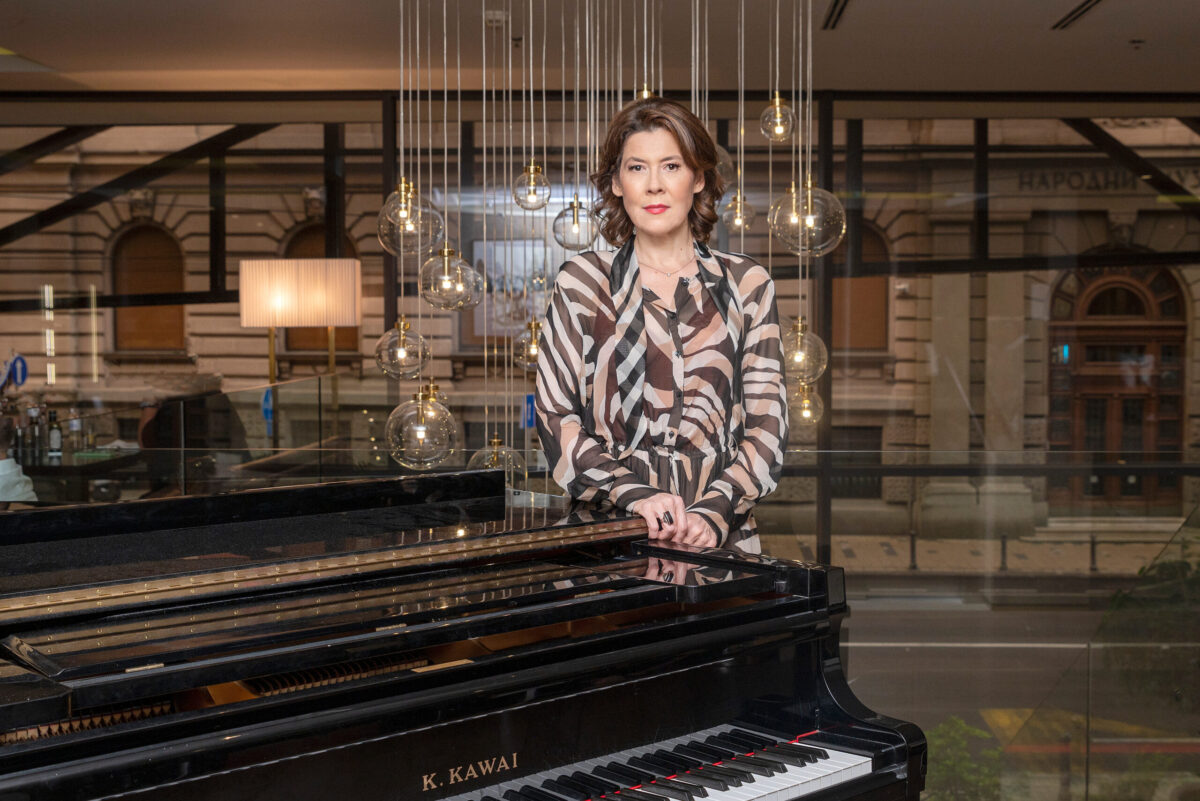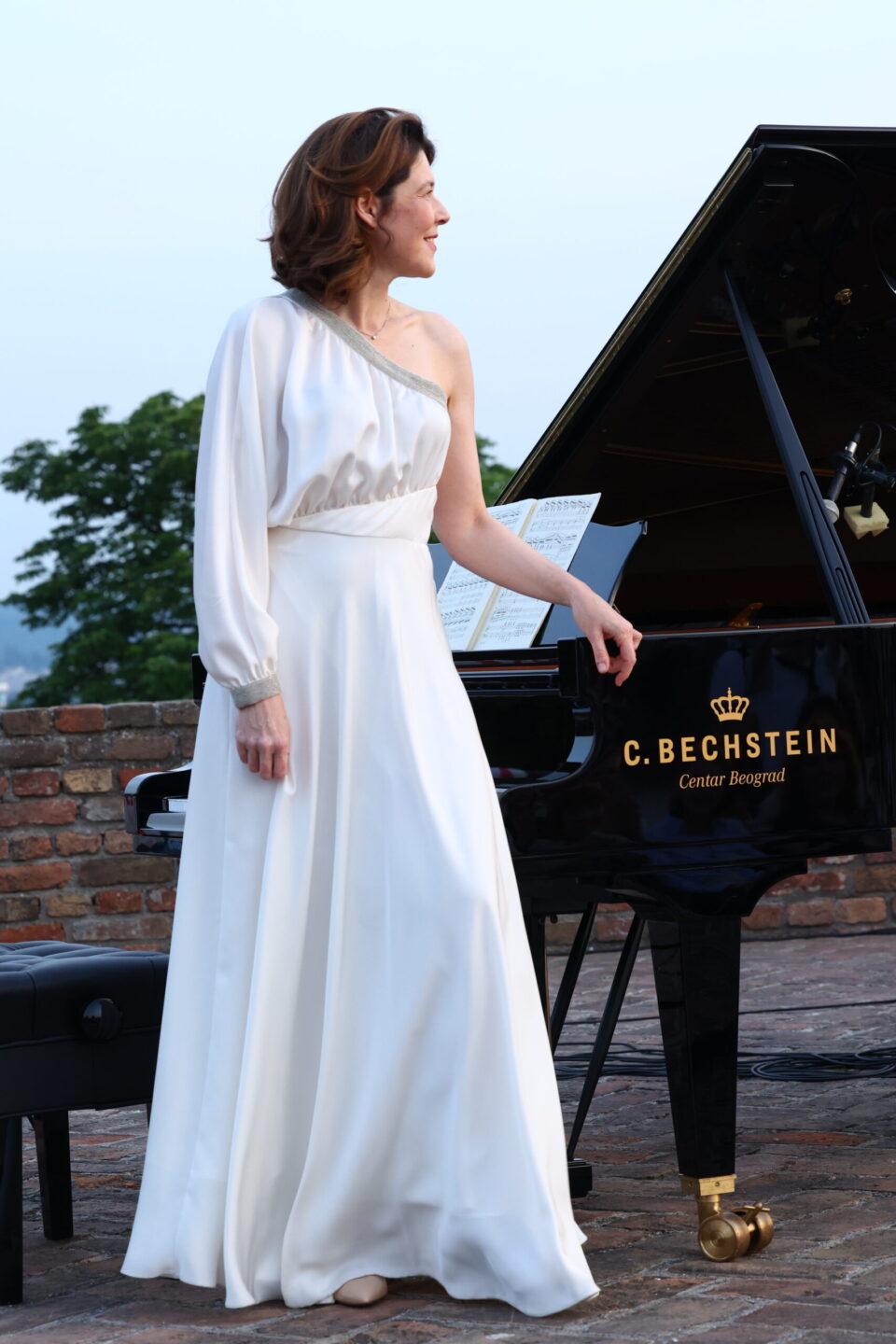ArtLink was founded as an expression of the need to create opportunities for the promotion of artists from Serbia.

A versatile artist, Jovanka Višekruna Janković is much more than a great pianist. Through her work in culture, and by founding ArtLink and the Camerata Balcanica orchestra, she has pushed the boundaries of Serbian culture and connected nations in a joint artistic endeavor.
As the founder and Artistic Director of the ArtLink association, you have done a lot to promote Serbian culture around the world. How is our culture accepted and perceived internationally?
ArtLink was founded as a manifestation of the need to create opportunities for the promotion of artists from Serbia. As a young artist, I was formed in the nineties, which were both the hardest and the most painful years in our recent history. I am lucky to have studied at the Franz Liszt Academy in Budapest, which at the time had many international students, and I made great efforts to organise my own concerts wherever possible.
I managed to get invited, as the only artist from Eastern Europe, to the Banff Centre for Arts and Creativity in Canada, which invited artists from all over the world and where I performed in a multicultural international environment for two seasons. Back then I was an ambassador of sorts for my country, at a time when it had a predominantly negative image. I was glad that, through my performances and my attitude, I always left a positive impression and presented a different image of our country and the region, which at the time was marked by wars. That positive personal experience of positioning an artist from Serbia on the international stage was the main inspiration for establishing ArtLink as a platform, festival, network for the promotion and connection of young artists from Serbia and the region. And for their integration into European and global art programmes. The artistic act is mostly personal, and this personal stamp that artists leave on their performances and works, through their attitude and the interaction they develop with their colleagues and the audience, also influences the creation of a positive image of the country they come from.
Do you think it’s difficult to be a pianist and nurture classical music in Serbia?
I think that being a pianist and being an artist and nurturing classical music is not easy, and that surviving in this profession is a big challenge, especially for a freelance artist or an independent institution. In Serbia and in our region, it is certainly much more difficult than in some European countries that have a much longer tradition of nurturing and valuing classical music, and therefore have a developed audience as well as a market that definitely offers a lot more opportunities for professional engagement. In our country, it is necessary to bring art music closer to a wider audience and teach them how to listen to music. I think it is difficult to love something that you know little about or don’t know enough. Still, in recent years, we have witnessed a lot more initiatives and concerts in Serbia, which are trying to reach their audience with more or less success. Classical or art music needs to be valued much more and should be given the attention it deserves, and the audience needs to be educated from a young age.
Camerata Balcanica is an example of successful regional cooperation and reconciliation through culture and music
With the Camerata Balcanica chamber orchestra, you have demonstrated that it is possible to successfully combine traditional and classical culture. How has that formula been accepted abroad?
Camerata Balcanica is an example of successful regional cooperation and reconciliation through culture and music. ‘United in music’ is one of our mottos, because Camerata Balcanica brings together the best young artists from the entire region. I believe this is the first example of such practice, because its roots go back to 2004, when ArtLink founded the Nordic – Balkan Chamber Orchestra, where young artists from across the Balkans came together in a joint musical project for the first time. Since then, the constant focus of ArtLink has been on the region and regional cultural cooperation, as well as on the revival and strengthening of our old, forgotten connections. Camerata Balcanica is also our connection with Europe and the world, a way of presenting ourselves in a more beautiful and positive light and a way of being a part of Europe and the world together.
You founded the ArtLink festival. How has it contributed to Serbia’s cultural and music scene?
The ArtLink festival was founded as the ArtLink Young Talents’ Festival, and it was the first initiative of its kind, which offered an opportunity to young, emerging artists from Serbia but also from Europe.
That opportunity also included education and mentoring by world-renowned artists, who shared their knowledge and experience with young artists between 7 and 18 years of age, and who formed part of the ArtLink programme for young talents. I am especially proud of the fact that many of those young talents performed with an orchestra for the first time at the ArtLink festival, that many had the opportunity to perform with masters of their craft, from whom they learned a lot, and to get a chance to perform with European orchestras.
The ArtLink festival launched its programme for young talents and the ArtLink Young Virtuosi orchestra, which served as a model for the project that Stefan Milenković is now working on along with our selection of string players.
These virtuosi have performed with Stefan Milenković at the ArtLink festival, but also with names such as Ištvan Vardai, Jan Vogler, Fedor Rudin, Giorgio Mandolesi and many others. Also, the ArtLink festival was the first to showcase our best young artists – violinist Lana Zorjan, cellist Petar Pejčić, Vuk Ovaskainen, as well as Nemanja Stanković, Una Stanić, Irena Josifoska and many others. Many European artists who are now among the leading artists of the younger generation were represented at the ArtLink festival, among them the French pianist Jean Paul Gasparian, Norwegian violinist Sonoko Miriam, Italian pianist Alberto Ferro and many others. Therefore, the ArtLink festival has focused on the so-called Rising Stars.
You have brought many world-renowned artists to Serbia. How has our audience received them and how have they received our audience and culture?
The ArtLink festival is a meeting place for artists of different generations, cultures, expressions, and a place where they all create unique artistic productions together, generally premiering at the ArtLink festival. To my great satisfaction as the festival’s Artistic Director, my invitations and suggestions related to the selection of the programme, artists and performance venues, although always challenging, new and original, have regularly met with great reception by foreign artists – those with a worldwide reputation no less.
One of the best German cellists, Jan Vogler, accepted the challenge each time both in terms of programming and production and was happy to be part of completely new ensembles and non-standard programmes at the ArtLink festival, as well as the famous John Malkovich and the Vienna Orchestra who accepted my proposal to perform at Felix Romuliana near Zaječar. It is a great trust bestowed upon me by these artists, because they step away from their standard production conditions and accept the challenge.
What is important is that these challenges have always been successful in implementation as well as interesting for the artists. At the same time, Serbia has entered their annual presentations of interesting cultural destinations, and the audience in Serbia is constantly experiencing something new and worth remembering. On top of this, a special synergy has regularly formed among the artists, opening the door to new joint professional engagements.
ArtLink is an artistic enterprise that doesn’t stop, it is in constant movement, construction and artistic intervention
What are ArtLink’s future plans? What exciting things can we expect?
ArtLink is an artistic enterprise, which doesn’t stop, it is in constant movement, construction and artistic intervention. Starting with numerous activities within the European Festivals Association, where ArtLink is the contact point for the Western Balkans, the contact point for Belgrade in the Festival Cities Initiative, the initiator and leader of the Platform for Women Artists, as well as an active promoter of the United Nations goals related to the green agenda, peace and respect of diversity through the programmes – Artists for Nature, Music for Peace. We are continually dedicated to children and education and always emphasise the importance of music and art in all segments of life, including our health. ArtLink is preparing new productions that will be presented in our region and abroad, in collaboration with our partners.
Your work on strengthening relations with other countries and nations has been recognised, and for this reason you are the recipient of the Knighthood in the Order of Arts and Letters of the French Republic as well as the award for your contribution to the development of Serbian-American relations. How important are these awards and recognitions, in addition to the professional ones, to you?
Culture is the meeting point for our diversity and our common values, our past and present. Through culture, our personal but also common attitudes, thoughts, dilemmas and emotions are much better expressed, through culture our conversations with others are always inspiring and bring out the best in us.
I always like to look on the bright side, and to rejoice, admire and respect the achievements of other cultures and nations, as well as to constantly highlight the best that we as a country have to present.
The Knighthood in the Order, awarded by the Ministry of Culture of the French Republic, is an award for the significant life’s work of each individual recipient, and I am proud to point out that the ArtLink festival has published a music CD to mark the centenary of the partnership between France and Serbia in WWI and in the year of the centenary of Claude Debussy’s passing, as well as for the 180th anniversary of diplomatic relations between the two countries, with the support of the Ministry of Culture. The award for the contribution to the development of cultural relations with the USA is of great importance and a confirmation that, through my work and commitment, I have contributed to a better understanding of our cultures and nations. The key to good relations is understanding and respect for others, and I am glad if, through my efforts, I managed to take a step towards greater understanding and cooperation, towards recognising the value of other nations’ cultures, and to build a new bridge that will unite artists in a joint artistic endeavour.
